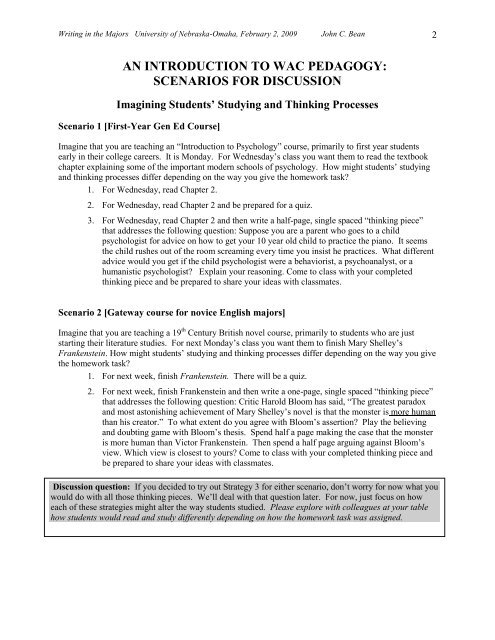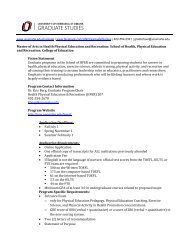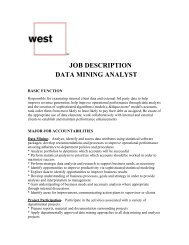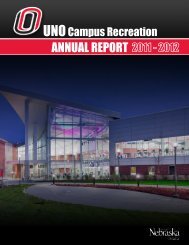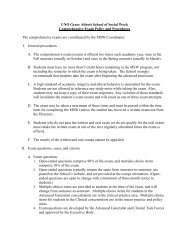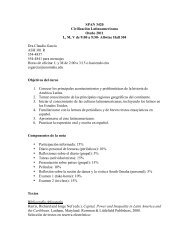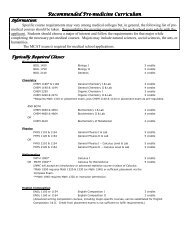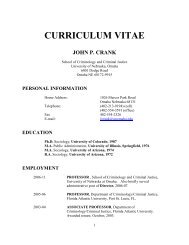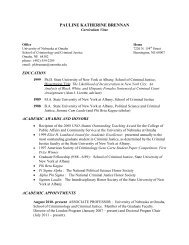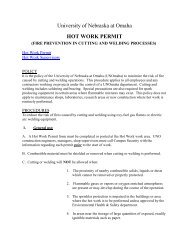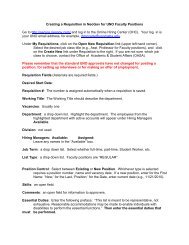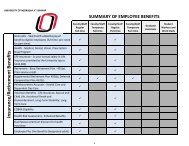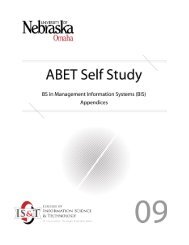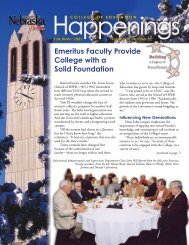WRITING IN THE MAJORS: - University of Nebraska Omaha
WRITING IN THE MAJORS: - University of Nebraska Omaha
WRITING IN THE MAJORS: - University of Nebraska Omaha
Create successful ePaper yourself
Turn your PDF publications into a flip-book with our unique Google optimized e-Paper software.
Writing in the Majors <strong>University</strong> <strong>of</strong> <strong>Nebraska</strong>-<strong>Omaha</strong>, February 2, 2009 John C. Bean 2<br />
AN <strong>IN</strong>TRODUCTION TO WAC PEDAGOGY:<br />
SCENARIOS FOR DISCUSSION<br />
Imagining Students’ Studying and Thinking Processes<br />
Scenario 1 [First-Year Gen Ed Course]<br />
Imagine that you are teaching an “Introduction to Psychology” course, primarily to first year students<br />
early in their college careers. It is Monday. For Wednesday’s class you want them to read the textbook<br />
chapter explaining some <strong>of</strong> the important modern schools <strong>of</strong> psychology. How might students’ studying<br />
and thinking processes differ depending on the way you give the homework task?<br />
1. For Wednesday, read Chapter 2.<br />
2. For Wednesday, read Chapter 2 and be prepared for a quiz.<br />
3. For Wednesday, read Chapter 2 and then write a half-page, single spaced “thinking piece”<br />
that addresses the following question: Suppose you are a parent who goes to a child<br />
psychologist for advice on how to get your 10 year old child to practice the piano. It seems<br />
the child rushes out <strong>of</strong> the room screaming every time you insist he practices. What different<br />
advice would you get if the child psychologist were a behaviorist, a psychoanalyst, or a<br />
humanistic psychologist? Explain your reasoning. Come to class with your completed<br />
thinking piece and be prepared to share your ideas with classmates.<br />
Scenario 2 [Gateway course for novice English majors]<br />
Imagine that you are teaching a 19 th Century British novel course, primarily to students who are just<br />
starting their literature studies. For next Monday’s class you want them to finish Mary Shelley’s<br />
Frankenstein. How might students’ studying and thinking processes differ depending on the way you give<br />
the homework task?<br />
1. For next week, finish Frankenstein. There will be a quiz.<br />
2. For next week, finish Frankenstein and then write a one-page, single spaced “thinking piece”<br />
that addresses the following question: Critic Harold Bloom has said, “The greatest paradox<br />
and most astonishing achievement <strong>of</strong> Mary Shelley’s novel is that the monster is more human<br />
than his creator.” To what extent do you agree with Bloom’s assertion? Play the believing<br />
and doubting game with Bloom’s thesis. Spend half a page making the case that the monster<br />
is more human than Victor Frankenstein. Then spend a half page arguing against Bloom’s<br />
view. Which view is closest to yours? Come to class with your completed thinking piece and<br />
be prepared to share your ideas with classmates.<br />
Discussion question: If you decided to try out Strategy 3 for either scenario, don’t worry for now what you<br />
would do with all those thinking pieces. We’ll deal with that question later. For now, just focus on how<br />
each <strong>of</strong> these strategies might alter the way students studied. Please explore with colleagues at your table<br />
how students would read and study differently depending on how the homework task was assigned.


